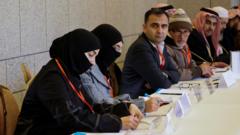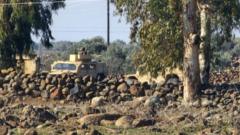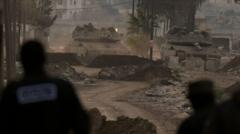The declaration of Ahmed al-Shara as interim president of Syria has sparked celebrations among some, while others express concerns about the lack of transparency and inclusivity in the new government structure.**
New Leadership in Syria: Transition Amid Uncertainty**

New Leadership in Syria: Transition Amid Uncertainty**
Ahmed al-Shara Takes Presidency as Concerns Over Centralization Surface**
In a pivotal moment for Syrian politics, Ahmed al-Shara, the rebel leader instrumental in the ousting of Bashar al-Assad, was declared president during a turbulent transitional phase amid the continuing civil conflict. The announcement, made on state media from Damascus, set off celebrations in the streets, marking a new chapter in the country's struggle for self-determination.
Al-Shara's ascendancy has been characterized by swift and unilateral decisions, including the dissolution of the existing Constitution and the previous legislative body, actions that have raised eyebrows among various factions within Syria. While many citizens expressed joy at the prospect of a new governance structure, a significant number of Syrians are anxious about the absence of direct public engagement from their new leader.
Critics, including Dr. Salam Said, an expert on Syrian politics, have expressed skepticism regarding the consolidated power held by al-Shara's coalition. "It represents a very centralized, authoritarian approach," she remarked, as many progressive groups in Syria feel sidelined in this reshaping of authority. The critical question looming over this transitional period is its duration and the implications for wider representation in future governance.
As the nation collectively holds its breath, the lack of clarity regarding the direction of this new government leaves many asking: just how long will this transitional phase last, and will it include voices from the diverse spectrum of Syrian society? In the heart of Damascus, discussions about the future continue, reflecting a profound yearning for inclusive governance while grappling with the reality of newly established power dynamics.
Al-Shara's ascendancy has been characterized by swift and unilateral decisions, including the dissolution of the existing Constitution and the previous legislative body, actions that have raised eyebrows among various factions within Syria. While many citizens expressed joy at the prospect of a new governance structure, a significant number of Syrians are anxious about the absence of direct public engagement from their new leader.
Critics, including Dr. Salam Said, an expert on Syrian politics, have expressed skepticism regarding the consolidated power held by al-Shara's coalition. "It represents a very centralized, authoritarian approach," she remarked, as many progressive groups in Syria feel sidelined in this reshaping of authority. The critical question looming over this transitional period is its duration and the implications for wider representation in future governance.
As the nation collectively holds its breath, the lack of clarity regarding the direction of this new government leaves many asking: just how long will this transitional phase last, and will it include voices from the diverse spectrum of Syrian society? In the heart of Damascus, discussions about the future continue, reflecting a profound yearning for inclusive governance while grappling with the reality of newly established power dynamics.






















